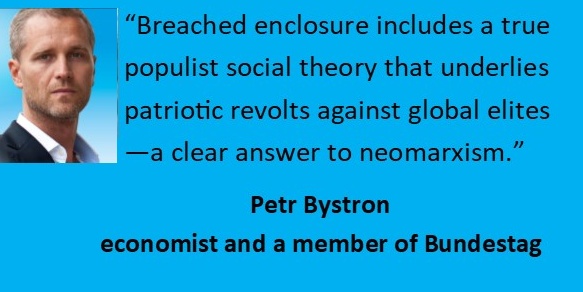We should be aware that free migration is closely related to the neoliberal concept of privatisation. Neoliberals do not recognise collective (national, state) ownership, which provokes a twofold reaction: 1) they recommend its transfer into private hands, 2) they understand collective resources as unoccupied natural resources that anyone has the right to seize. (This is why they not infrequently recommend deregulation in the use of public resources.)
Interestingly, even leftist liberals understand this principle when it applies to anyone other than the peoples of Western civilization. When Canadian Prime Minister Stephen Harper wanted to abolish the collective status of Indian territories and replace it with private ownership by individual tribal members, it was clear even to left-liberals that the idea was to allow mining companies to take the territory by subsequent purchase.
We should be aware that free migration is closely related to the neoliberal concept of privatisation.
Liberalisation on the sale of land and property to foreigners, or foreigners’ access to social benefits and the electoral system, are measures of the same kind as the corporation’s planned expropriation of Indian territory. The idea is to make society lose control of its resources so that they can be more easily captured by global market players.
It is amusing that the same left-liberals who were committed to fighting neoliberal economic reforms are now taking a strictly neoliberal position on migration. Liberal intellectuals ironize the so-called populist movements and their intention to regain control of the nation state. Are they missing the economic dimension of the problem? What is collective ownership about other than control? And what else is ownership more closely related to than economics? If a society loses control of its territory, who will regain it?
So there are various interests behind the liberalisation of migration – primarily the economic and political interests of the global upper class.
So there are various interests behind the liberalisation of migration – primarily the economic and political interests of the global upper class. Some of the considerations behind it are also quite dark, such as the desire to destroy indigenous peoples. As a German Green Party politician put it: it is good that in a few years we will have a super-cultural society and there will be no ethnic majority. So, while some in the liberal camp discredit anyone who points out the risk of rewriting the ethnic map of Europe (claiming to be spreading the fascist conspiracy theory of the “great replacement”), at the same time other liberals are already praising this target state as desirable.
There is a lot at stake in the issue of mass migration. If the state is unable to control the borders, then a power vacuum opens up into which other powerful players – 1) multinational corporations, 2) foreign governments, 3) universalist (and therefore imperialist) ideologies like progressive liberalism and Islamism – rush in. Nation-states and societies can be destabilized and even destroyed. But the winner, whoever it may be, will control economic resources and the movement of people not less but more; albeit perhaps within changed boundaries.
Adam Votruba is a Czech historician.


